WOW
SLOW TRAVEL
52 CITIES
1 WEEK
EACH CITY
52 WEEKS
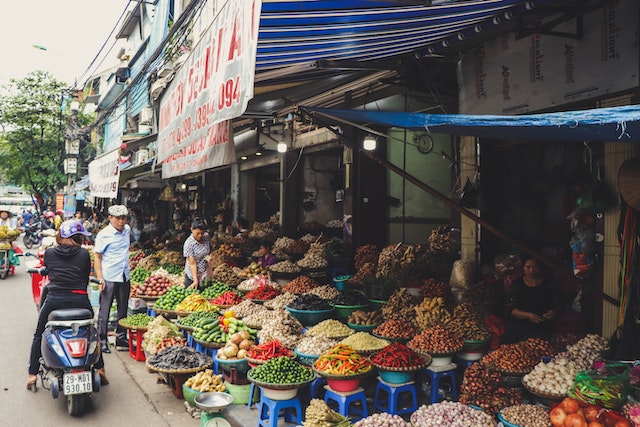
Vietnam
Vietnam is an increasingly popular destination for retirees due to its affordability, natural beauty, rich history, and vibrant culture. It offers a range of options for retirees looking to enjoy a comfortable and fulfilling retirement. Here are some key considerations and popular retirement destinations in Vietnam:
Key Considerations:
Cost of Living: Vietnam is known for its low cost of living, making it an attractive destination for retirees. Housing, food, transportation, and healthcare are generally affordable, allowing retirees to stretch their budgets.
Healthcare: Vietnam has a growing healthcare system with modern facilities, and medical services are often less expensive than in Western countries. Major cities like Hanoi and Ho Chi Minh City have international-standard hospitals.
Visa and Legal Requirements: Vietnam has specific visa requirements for retirees, such as the retirement visa (TRC). These visas may require proof of financial stability and compliance with certain conditions.
Language: Learning some Vietnamese can be helpful for daily life, but many people in urban areas, especially younger generations and those in the service industry, speak English.
Climate: Vietnam has a diverse climate, from the tropical south to the temperate north. Retirees can choose the climate that suits them best.
Popular Retirement Destinations in Vietnam:
Ho Chi Minh City (Saigon):
Vietnam’s largest city, Ho Chi Minh City offers a dynamic urban lifestyle with a mix of modern amenities and cultural attractions.
The city has a growing expatriate community and various neighborhoods to choose from.
Hanoi:
As the capital city, Hanoi boasts a rich historical and cultural heritage. It has a more relaxed pace compared to Ho Chi Minh City.
Hanoi offers a mix of colonial architecture, ancient temples, and vibrant street markets.
Da Nang:
Da Nang is a coastal city known for its beautiful beaches and a more laid-back atmosphere.
It’s a growing destination for retirees looking for a combination of coastal living and urban amenities.
Hoi An:
Hoi An, a UNESCO World Heritage site, is a charming town known for its well-preserved ancient architecture, lantern-lit streets, and a tranquil lifestyle.
It’s a favorite destination for retirees seeking a peaceful and culturally rich environment.
Nha Trang:
Nha Trang is a coastal city with a tropical climate, making it popular for beach lovers and water sports enthusiasts.
It offers a range of amenities and a relaxed lifestyle.
Phu Quoc Island:
Phu Quoc is a beautiful island in southern Vietnam known for its pristine beaches, lush landscapes, and a developing tourism industry.
It’s becoming an increasingly attractive option for retirees seeking an island paradise.
Dalat:
Dalat is a mountainous city with a cooler climate, known for its scenic beauty, flower gardens, and a more relaxed pace of life.
It’s a unique destination in Vietnam, offering a break from the tropical heat.
Vietnam’s diversity in terms of culture, climate, and lifestyle options makes it a versatile choice for retirees. Whether you prefer the energy of a bustling city or the tranquility of a beachside town, Vietnam offers a range of retirement destinations to suit various preferences and budgets
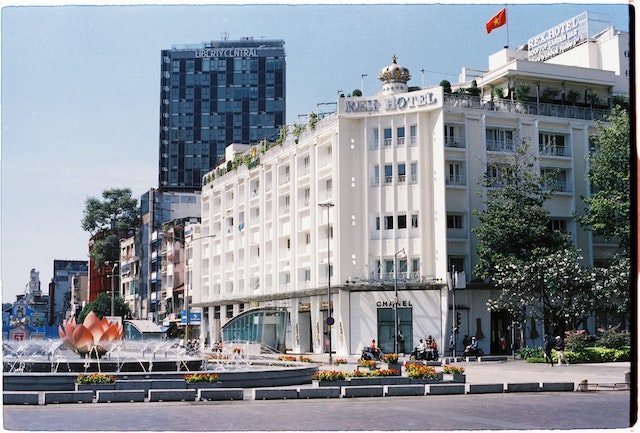
Ho Chi Minh City
Ho Chi Minh City, commonly referred to as Saigon, is Vietnam’s largest city and a dynamic and bustling metropolis. It’s a popular destination for retirees due to its vibrant urban lifestyle, historical attractions, and a growing expatriate community. Here’s what you need to know about retiring in Ho Chi Minh City:
Cost of Living:
Ho Chi Minh City offers a range of living options to suit different budgets. While some areas can be pricier, you can find affordable housing, dining, and daily expenses.
Healthcare:
The city has modern hospitals and medical facilities, including international-standard healthcare providers. Medical services are generally affordable compared to Western countries.
Visa and Legal Requirements:
Vietnam has specific visa requirements for retirees, such as the retirement visa (TRC). These visas may require proof of financial stability and compliance with certain conditions.
Community and Lifestyle:
Ho Chi Minh City has a diverse expatriate community, providing opportunities for socializing and networking with people from around the world.
The lifestyle in the city is dynamic, with numerous cultural events, dining options, and entertainment venues.
Cultural Attractions:
The city boasts a rich history and cultural heritage. Explore historic sites like the War Remnants Museum, Reunification Palace, and Notre-Dame Cathedral Basilica of Saigon.
Enjoy the vibrant street food scene, visit local markets, and experience traditional Vietnamese customs and festivals.
Transportation:
Getting around Ho Chi Minh City is convenient with taxis, motorbike taxis, and a developing public transportation system, including a metro under construction.
Climate:
The city has a tropical climate with a wet season from May to October and a dry season from November to April.
Dining and Cuisine:
Ho Chi Minh City offers a diverse range of dining options, from street food stalls to upscale restaurants. Explore Vietnamese cuisine and international dishes.
Entertainment and Nightlife:
The city is known for its nightlife, with numerous bars, clubs, and entertainment venues. The Bui Vien Street in the backpacker district is famous for its vibrant nightlife scene.
Shopping:
Explore local markets like Ben Thanh Market and Saigon Square for shopping opportunities. The city also has modern shopping malls with international brands.
Ho Chi Minh City offers retirees a lively and culturally rich retirement experience in the heart of Vietnam. Whether you’re interested in exploring historical sites, indulging in delicious cuisine, or enjoying the vibrant urban atmosphere, Saigon provides retirees with a dynamic and fulfilling retirement lifestyle in Southeast Asia
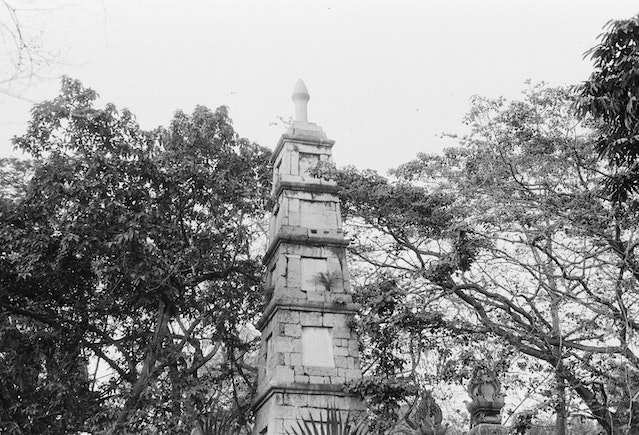
Hanoi
Hanoi, the capital of Vietnam, is a city known for its rich history, cultural heritage, and a more relaxed pace of life compared to bustling metropolises. It’s a popular destination for retirees seeking a serene and culturally immersive retirement experience. Here’s what you need to know about retiring in Hanoi:
Cost of Living:
Hanoi offers a more affordable cost of living compared to some other capital cities in the region. Housing, food, and daily expenses are generally reasonably priced.
Healthcare:
The city has modern hospitals and medical facilities, including international-standard healthcare providers. Medical services are generally affordable compared to Western countries.
Visa and Legal Requirements:
Vietnam has specific visa requirements for retirees, such as the retirement visa (TRC). These visas may require proof of financial stability and compliance with certain conditions.
Cultural Attractions:
Hanoi boasts a rich historical and cultural heritage. Explore ancient temples, including the Temple of Literature and the One Pillar Pagoda.
Stroll through the Old Quarter with its narrow streets, traditional architecture, and street markets.
Community and Lifestyle:
Hanoi has a growing expatriate community, providing opportunities for socializing and networking with people from around the world.
The lifestyle in the city is more laid-back compared to some larger cities, making it suitable for retirees seeking a peaceful environment.
Transportation:
Getting around Hanoi is convenient with taxis, cyclos (pedicabs), and a developing public transportation system, including buses.
The city has a domestic airport with connections to major Vietnamese cities.
Climate:
Hanoi experiences a subtropical climate with distinct seasons. Winters (November to March) are cooler and drier, while summers (May to September) are hot and humid.
Dining and Cuisine:
Hanoi offers a diverse range of dining options, including street food stalls, local eateries, and international restaurants. Don’t miss trying Vietnamese specialties like pho and bun cha.
Arts and Entertainment:
Enjoy traditional Vietnamese music and water puppetry shows at local theaters.
The city has a growing art scene with numerous galleries and exhibitions.
Outdoor Activities:
Explore the city’s numerous parks and lakes, such as Hoan Kiem Lake, where you can participate in tai chi or simply enjoy the scenery.
Hanoi is a gateway to beautiful natural areas in northern Vietnam, including Sapa and Halong Bay.
Hanoi provides retirees with a culturally rich and tranquil retirement experience in the northern part of Vietnam. Whether you’re interested in exploring historical sites, savoring local cuisine, or simply enjoying a more relaxed pace of life, Hanoi offers retirees a serene and culturally immersive retirement destination in Southeast Asia
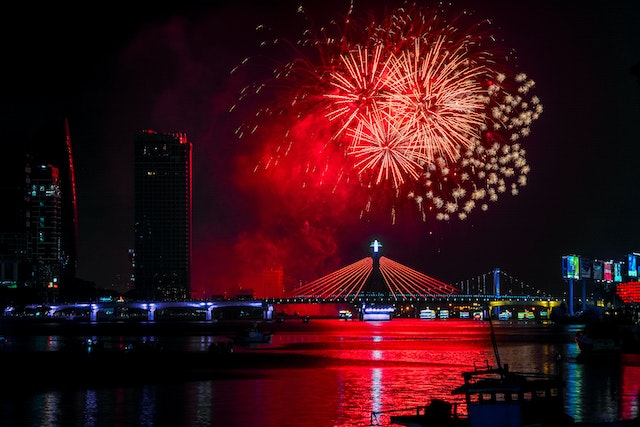
Da Nang
Da Nang, located on the central coast of Vietnam, is a vibrant and rapidly developing city that has become a popular destination for retirees. It offers a combination of urban amenities, stunning natural beauty, and a more relaxed lifestyle. Here’s what you need to know about retiring in Da Nang:
Cost of Living:
Da Nang is known for its affordability compared to larger cities like Hanoi and Ho Chi Minh City. Housing, dining, and daily expenses are generally reasonably priced.
Healthcare:
The city has modern hospitals and medical facilities, including international-standard healthcare providers. Medical services are generally affordable compared to Western countries.
Visa and Legal Requirements:
Vietnam has specific visa requirements for retirees, such as the retirement visa (TRC). These visas may require proof of financial stability and compliance with certain conditions.
Beaches and Natural Beauty:
Da Nang boasts some of Vietnam’s most beautiful beaches, including My Khe Beach and Non Nuoc Beach. You can enjoy swimming, water sports, and beachfront living.
The Marble Mountains, a cluster of limestone hills, provide opportunities for hiking and exploration.
Community and Lifestyle:
Da Nang has a growing expatriate community, providing opportunities for socializing and networking with people from around the world.
The lifestyle in the city is a mix of urban conveniences and a more relaxed atmosphere.
Dining and Cuisine:
Da Nang offers a diverse range of dining options, including street food stalls, seafood restaurants, and international cuisine. The city is known for its fresh seafood.
Transportation:
Getting around Da Nang is convenient with taxis, motorbike rentals, and a well-organized public transportation system.
The city has an international airport with connections to major Vietnamese cities and international destinations.
Climate:
Da Nang enjoys a tropical monsoon climate with a wet season from September to December and a dry season from January to August.
Golf:
The city and its surroundings have several world-class golf courses, making it a great destination for golf enthusiasts.
Arts and Culture:
Da Nang has a growing arts scene with numerous galleries and cultural events. The city hosts festivals and exhibitions throughout the year.
Da Nang offers retirees a combination of coastal living, urban conveniences, and natural beauty. Whether you’re interested in beachfront living, exploring nature, or enjoying the city’s cultural attractions, Da Nang provides retirees with a dynamic and fulfilling retirement experience in Vietnam
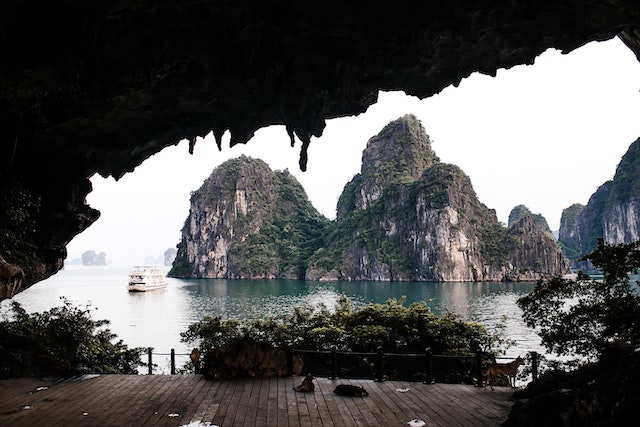
Hoi An
Hoi An, a charming ancient town on the central coast of Vietnam, is a popular destination for retirees seeking a peaceful and culturally rich retirement experience. Known for its well-preserved historic architecture, lantern-lit streets, and serene atmosphere, Hoi An offers a unique retirement destination. Here’s what you need to know about retiring in Hoi An:
Cost of Living:
Hoi An is generally more affordable than larger Vietnamese cities like Hanoi or Ho Chi Minh City. Housing, dining, and daily expenses are reasonably priced.
Healthcare:
The city has medical clinics and facilities to address common healthcare needs. For specialized care, nearby cities like Da Nang offer more comprehensive medical services.
Visa and Legal Requirements:
Vietnam has specific visa requirements for retirees, such as the retirement visa (TRC). These visas may require proof of financial stability and compliance with certain conditions.
Cultural Attractions:
Hoi An is a UNESCO World Heritage site known for its well-preserved ancient architecture. Explore historic homes, temples, and the iconic Japanese Covered Bridge.
The town has a rich cultural scene, including traditional music performances and festivals.
Community and Lifestyle:
Hoi An has a small expatriate community, providing opportunities for socializing and connecting with fellow retirees.
The lifestyle in Hoi An is tranquil and laid-back, making it suitable for those seeking a peaceful environment.
Dining and Cuisine:
Hoi An offers a diverse range of dining options, from local street food stalls to restaurants serving traditional Vietnamese and international cuisine.
Outdoor Activities:
Enjoy leisurely walks or bicycle rides through the historic town. The nearby countryside is dotted with rice fields and rural landscapes.
Hoi An’s location on the Thu Bon River provides opportunities for boat trips and riverfront dining.
Beaches:
Hoi An is close to beautiful beaches like An Bang Beach and Cua Dai Beach, where you can relax, swim, or enjoy water sports.
Climate:
Hoi An has a tropical monsoon climate with a wet season from September to December and a dry season from January to August.
Shopping:
Explore the town’s vibrant markets and boutique shops for handmade lanterns, tailor-made clothing, and local crafts.
Hoi An offers retirees a unique and culturally immersive retirement experience. Whether you’re interested in exploring historic sites, savoring local cuisine, or simply enjoying a peaceful riverside lifestyle, Hoi An provides retirees with a serene and culturally rich retirement destination in Vietnam
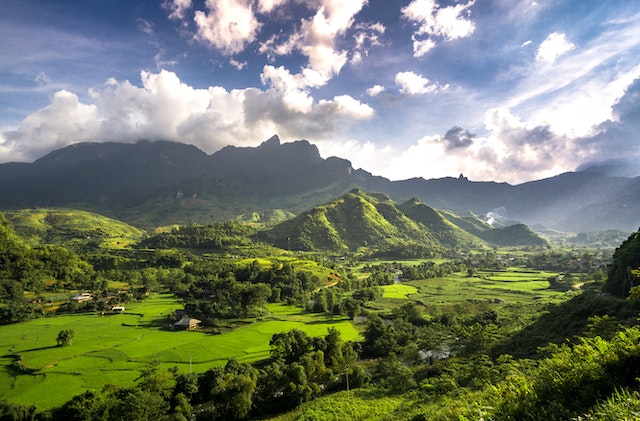
Nha Trang
Nha Trang, located on the south-central coast of Vietnam, is a picturesque coastal city known for its beautiful beaches, water sports, and a relaxed lifestyle. It’s a popular destination for retirees seeking a tropical paradise with a range of amenities. Here’s what you need to know about retiring in Nha Trang:
Cost of Living:
Nha Trang offers a relatively affordable cost of living, making it budget-friendly for retirees. Housing, dining, and daily expenses are generally reasonably priced.
Beaches and Natural Beauty:
The city is famous for its stunning beaches, including Nha Trang Beach, Bai Dai Beach, and Doc Let Beach. You can enjoy swimming, sunbathing, and water sports.
Nha Trang’s clear waters and coral reefs make it a popular destination for snorkeling and scuba diving.
Healthcare:
Nha Trang has hospitals and medical facilities that can address common healthcare needs. For more specialized care, nearby cities like Ho Chi Minh City offer comprehensive medical services.
Visa and Legal Requirements:
Vietnam has specific visa requirements for retirees, such as the retirement visa (TRC). These visas may require proof of financial stability and compliance with certain conditions.
Community and Lifestyle:
Nha Trang has a growing expatriate community, providing opportunities for socializing and connecting with people from around the world.
The lifestyle in Nha Trang is relaxed and suitable for retirees seeking a beachfront and coastal living experience.
Dining and Cuisine:
Nha Trang offers a diverse range of dining options, including seafood restaurants, local eateries, and international cuisine. Fresh seafood is a highlight.
Transportation:
Getting around Nha Trang is convenient with taxis, motorbike rentals, and a well-organized public transportation system.
Climate:
Nha Trang enjoys a tropical climate with a wet season from October to December and a dry season from January to September.
Golf:
The city and its surroundings have several golf courses, making it a great destination for golf enthusiasts.
Entertainment and Nightlife:
Nha Trang offers a range of entertainment options, including bars, clubs, and cultural shows. The city’s nightlife scene is lively.
Outdoor Activities:
Explore the nearby countryside, hiking trails, and waterfalls for outdoor adventures. The Ba Ho Waterfall is a popular hiking destination.
Nha Trang provides retirees with a serene and idyllic retirement experience by the sea. Whether you’re interested in beachfront living, water activities, or simply enjoying the coastal lifestyle, Nha Trang offers retirees a tropical paradise in Vietnam
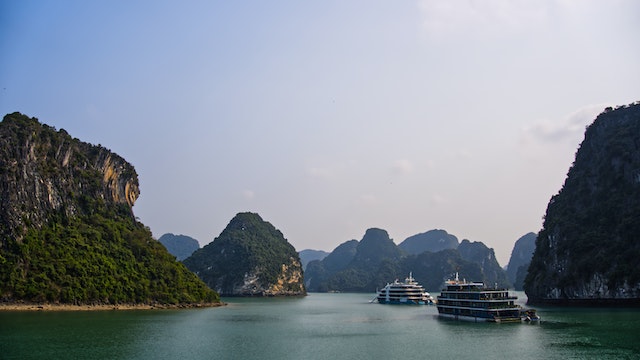
Phu Quoc Island
Phu Quoc Island, located in the Gulf of Thailand, is a tropical paradise and the largest island in Vietnam. It’s becoming an increasingly popular destination for retirees seeking an idyllic and relaxed retirement experience. Here’s what you need to know about retiring on Phu Quoc Island:
Cost of Living:
Phu Quoc Island offers a reasonable cost of living, with housing, dining, and daily expenses generally more affordable compared to larger cities.
The island’s status as a special economic zone provides certain tax incentives, making it attractive for retirees.
Beaches and Natural Beauty:
The island is known for its stunning beaches, including Long Beach, Sao Beach, and Ong Lang Beach, where you can enjoy swimming, sunbathing, and water sports.
Phu Quoc’s lush interior offers opportunities for hiking, exploring waterfalls, and experiencing the island’s natural beauty.
Healthcare:
While Phu Quoc has medical clinics and facilities, major healthcare services are available on the mainland in Ho Chi Minh City.
Visa and Legal Requirements:
Vietnam has specific visa requirements for retirees, such as the retirement visa (TRC). These visas may require proof of financial stability and compliance with certain conditions.
Community and Lifestyle:
Phu Quoc has a growing expatriate community, providing opportunities for socializing and connecting with people from around the world.
The lifestyle on the island is laid-back and suitable for retirees seeking a serene and beachfront living environment.
Dining and Cuisine:
Phu Quoc offers a range of dining options, including seafood restaurants, local eateries, and international cuisine. Fresh seafood is a highlight, and the island is known for its fish sauce.
Transportation:
Getting around Phu Quoc is convenient with taxis, motorbike rentals, and a developing road network. The island has its airport with domestic flights.
Climate:
Phu Quoc enjoys a tropical climate with a wet season from April to October and a dry season from November to March.
Water Activities:
The island is perfect for water activities like snorkeling, scuba diving, kayaking, and sailing. The surrounding waters have vibrant marine life and coral reefs.
Island Attractions:
Explore attractions like the Phu Quoc National Park, Vinpearl Safari, and the Dinh Cau Night Market for shopping and dining.
Phu Quoc Island provides retirees with a tranquil and tropical retirement experience. Whether you’re interested in beachfront living, exploring nature, or simply enjoying the island’s laid-back atmosphere, Phu Quoc offers retirees an idyllic retirement destination in Vietnam

Dalat
Dalat, located in the Central Highlands of Vietnam, is a picturesque and charming city known for its cooler climate, lush landscapes, and French colonial architecture. It’s a popular destination for retirees seeking a break from the tropical heat and a more relaxed retirement experience. Here’s what you need to know about retiring in Dalat:
Cost of Living:
Dalat offers a reasonable cost of living, with housing, dining, and daily expenses generally affordable. The city is known for its fresh produce and local markets.
Climate:
Dalat enjoys a temperate climate with cooler temperatures compared to much of Vietnam. It’s often referred to as the “City of Eternal Spring” due to its pleasant weather.
Healthcare:
The city has medical clinics and facilities to address common healthcare needs. For specialized care, nearby cities like Ho Chi Minh City offer comprehensive medical services.
Visa and Legal Requirements:
Vietnam has specific visa requirements for retirees, such as the retirement visa (TRC). These visas may require proof of financial stability and compliance with certain conditions.
Community and Lifestyle:
Dalat has a small expatriate community, providing opportunities for socializing and connecting with like-minded individuals.
The lifestyle in Dalat is peaceful and suitable for retirees seeking a cooler and quieter environment.
Outdoor Activities:
Explore the city’s numerous parks, gardens, and flower farms. The Valley of Love and Xuan Huong Lake are popular spots for leisurely walks.
Dalat offers opportunities for hiking, mountain biking, and exploring the surrounding hills and waterfalls.
Cultural Attractions:
The city has a rich cultural scene, including art galleries, music performances, and traditional festivals.
Visit historic sites like the Hang Nga Guesthouse (Crazy House) and the Dalat Railway Station.
Transportation:
Getting around Dalat is convenient with taxis, motorbike rentals, and a well-organized public transportation system.
Dining and Cuisine:
Dalat offers a variety of dining options, from local eateries serving Vietnamese cuisine to international restaurants. Don’t miss trying the local strawberries and artichokes.
Shopping:
Explore local markets for handicrafts, fresh produce, and souvenirs. The city is known for its textiles and coffee.
Education:
If you have family members or grandchildren, Dalat has international schools that provide quality education.
